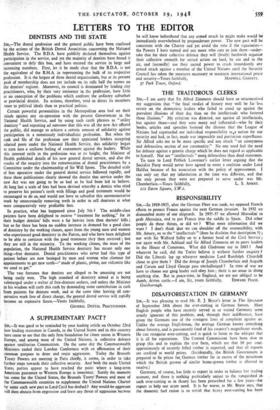TO THE EDITOR LETTERS
DENTISTS AND THE STATE
Sift,—The dental profession and the general public have been confused by the actions of the British Dental Association concerning the National Health Service. The B.D.A. have publicly declared themselves against participation in the service, and yet the majority of dentists have found it convenient to defy' this ban, and have entered the service in large and increasing numbers. First, let it be made clear that the B.D.A. is not the equivalent of the B.M.A. in representing the bulk of its respective profession. It is the largest of three dental organisations, but at its present peak of membership does not yet include on its rolls half the names on the dentists' register. Moreover, its council is dominated by leading city practitioners, who, by their very eminence in the profession, have little or no conception of the problems which confront the ordinary suburban or provincial dentist. Its actions, therefore, tend to direct its members more to political ideals than to practical politics.
Certain powerful personalities in the Metropolitan area had set their minds against any co-operation with the present Government in the National Health Service, and by using such catch phrases as "utility dentistry" and repeating ad nauseant that this was all the new Act offered the public, did manage to achieve a certain amount of solidarity against participation in a notoriously individualistic profession. But .when the rank and file of the profession saw their appointed leaders accepting salaried posts under the National Health Service, this solidarity began to turn into a uniform feeling of resentment against the leaders. While this internal strife in the profession was at its height, the Minister of Health published details of his new general dental service, and also the results of the enquiry into the remuneration of dental practitioners by a Committee under the chairmanship of Sir Will Spens. The detailed scale of fees operative under the general dental service followed rapidly, and these three publications clearly showed the dentist that service under the new Act was not going to be so bad as he had been led to believe. At long last a scale of fees had been devised whereby a dentist who tried to preserve his patient's teeth with fillings and good treatment would be encouraged to do so, and would not have to subsidise this tuiremunerative work by unnecessarily removing teeth in order to sell dentures at what were comparatively very profitable fees.
In practice, what has happened since July 5th ? The middle-class patients have been delighted to receive "treatment for nothing," for in their budget dentists' bills were a far heavier item than doctors' bills ; but so far there has been no sudden increase in demand for a good class of dentistry by the working classes, apart from the young men and women who experienced good dentistry in the Forces, and who have been delighted to be able to continue with the good treatment they then received ; but they are still in the minority. To the working classes, the mass of the population, the National Health Service dentistry has meant only one thing—free dentures. Dental practitioners who never had this type of patient before are now besieged by men and women who clamour for appointments to get new teeth—" made of plastic, please, not vulcanite like we used to get."
The vast fortunes that dentists are alleged to be amassing are not being easily won. The high standard of dentistry aimed at is being submerged under a welter of free-denture seekers, and unless the Minister in his wisdom will curb this rush by demanding some contribution in cash from patients for denture work, and at the same time leaving all con- servative work free of direct charge, the general dental service will rapidly become an expensive fiasco.—Yours faithfully, GENERAL DENTAL PRACTITIONER.


































 Previous page
Previous page